The Social Innovation Programme (SIP) is an eight-week programme which trains and supports university students to take on a client brief set out by a social impact community organisation. In Bristol this year, the client organisations were OTR Bristol; Womankind Bristol; IntoUniversity and Bristol Mind. Each group also had a mentor from Burges Salmon, who they could go to for extra advice and support throughout the process.
On April 17, I was lucky enough to be invited to be on the judging panel at the final celebration event, hosted at Burges Salmon. It was a wonderful afternoon and opportunity for the students to reflect on their achievements. My fellow panellists were Kath Ayres, Knowledge Exchange and SME Programme Manager at the University of Bristol Careers Service, and Roxanne Ratcliff, Head of ESG at Burges Salmon. We had the tough task of choosing winners in the following categories: best individual presenter; best presentation slides; and best overall presentation.
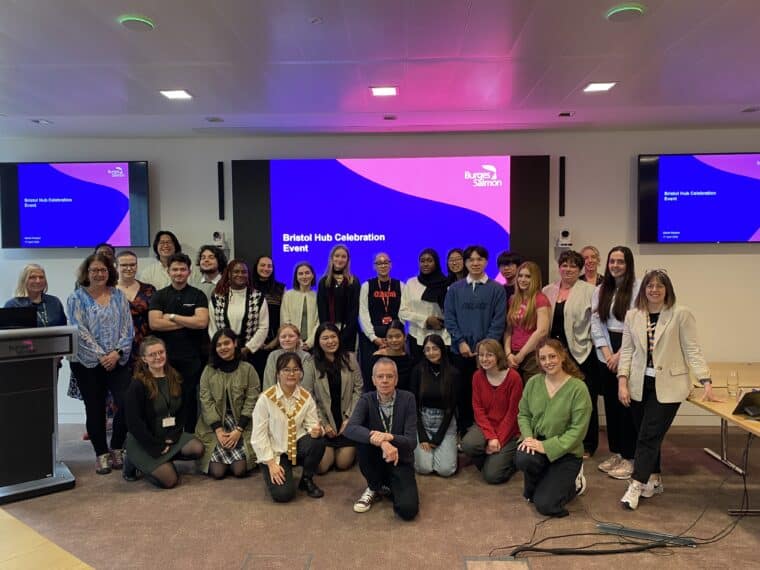
If you’re curious to find out more, grab a drink, get comfy and keep reading: I’ll take you through all four fantastic groups and reveal our winners at the end!
Bristol Mind
The student team working with Bristol Mind set out to conduct research with young adults and wellbeing services looking into mental health challenges faced by 18 – 25 year olds, and barriers to accessing support. Their aim was to inform mental health support for young adults in Bristol, making a real impact on their lives and showcasing the value of Bristol Mind’s work.
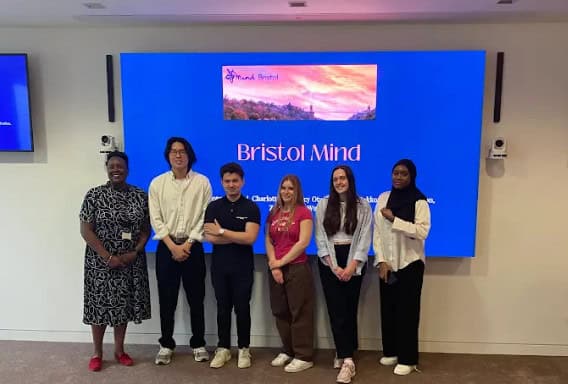
The team delivered an incredibly confident presentation – especially as they had been given the daunting task of going first! They shared lots of detailed information about how they had tackled their brief: they’d had the great idea to split into three sub-groups and work on an area that matched their strengths and interests. When I asked them to share their reflections on this method, I was impressed to hear about how well they’d communicated as a whole team to ensure they all remained on the same page while working on different tasks. It was definitely testament to their organisation skills!
They did a wonderful job of aligning the visual element of their presentation with Bristol Mind’s branding, which really emphasised the care they had put into the project.
At the end of their presentation, they shared the recommendations they’d put forward to Bristol Mind. These were incredibly detailed and well-researched as a result of their attention to each element of the brief. For example, they had some great advice about targeted advertising campaigns to ensure word was getting to students to help shift the preconception that they do not ‘need’ support services, which was identified as a barrier to access. A wonderful way to kick off the celebration event!
OTR (Off The Record)
The second team of the day had a strategic task from their client: “Develop a new strategy to help OTR to reach potential volunteers that are not in higher education, which refers to those youths around 18-25 and who do not go to university for further education”.
This was a challenging brief that meant the students really had to push themselves outside of the ‘university bubble’ and find ways to engage with peers who were not also in higher education. They reflected on how university students benefit from the experiences gained through volunteering so that they could make a case as to the double-benefit that could be achieved by the voluntary sector engaging with those from more diverse backgrounds: their client organisation, and others, would benefit from a wider range of ideas and perspectives, while young people not in higher education would gain skills and build their networks. It was great to see the group reflecting on their own experiences but also being able to look beyond that and understand volunteering from other points of view. Their presentation was clean and clear visually, and certainly did not look out of place in a law firm’s boardroom!
They supplemented their research by interviewing current OTR volunteers and surveying young people, meaning they were able to make ten incredibly well-informed recommendations. These ranged from quick fixes regarding wording changes on OTR’s website to longer-term ideas for broadening their reach, and were certainly appreciated by the organisation. The team reflected on both the challenges and successes they faced throughout the process, which was great to see. At Student Hubs we encourage our staff to share their failures as ready as their successes, so it was lovely to see students taking this approach to their work. It was particularly lovely to hear that they felt their biggest success was how well they’d managed to work together as a team.
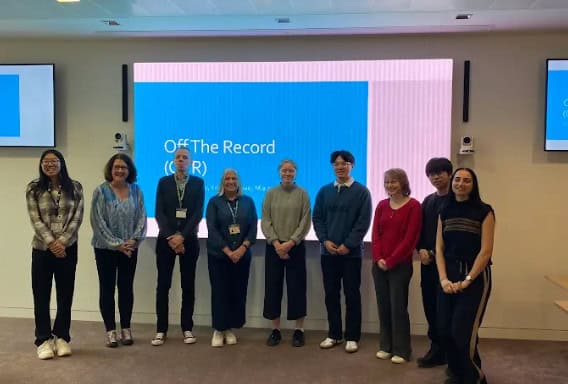
IntoUniversity
The IntoUniversity team were presented with a two-pronged challenge:
- Devise a short-term recruitment strategy for the Bristol centres that would be implemented for the remainder of the academic year, and
- Build a long term plan for the 2024 – 25 academic year that focused on recruitment and retention.
This team delivered another excellent project. The students started by identifying the positive and negative aspects of current volunteers at IntoUniversity. This enabled them to investigate why volunteers might not be staying in their roles, although this presented a bit of a challenge as none of the volunteers surveyed had had a negative experience, with most suggesting they’d recommend it to a friend! As a result, the team also focused on how IntoUniversity could more effectively promote the positives of volunteering, such as the development of transferable workplace skills to encourage more people into the roles. Along with further research, this allowed for a thought-out set of recommendations that certainly answered the brief.
This group was particularly adept at evaluating their own work: they were open about challenges they’d faced and the limitations of their research. Again, this was great to see as it emphasised to me that they were keen to improve on what was realistically a very well-researched and thoughtful project!
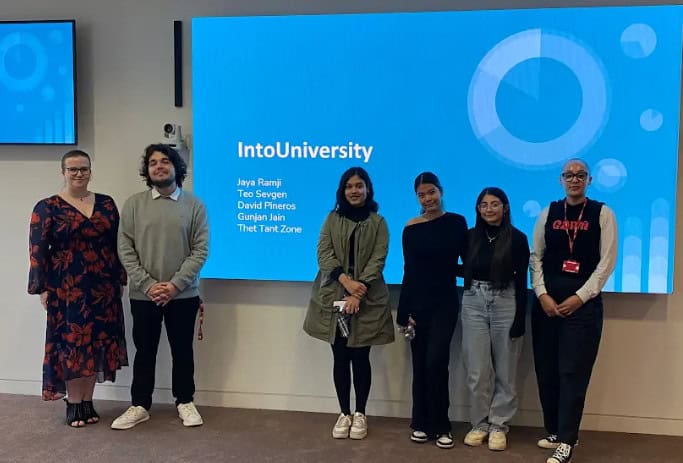
Another impressive aspect of their work was the delivery of their presentation – one member of the group joined via video link. The panel talked afterwards about how we often worry about technical difficulties or disjointed communication when this is the case but the group completely assuaged our concerns and delivered a smooth, confident talk. A fantastic example of how technology is a fantastic tool for inclusion and accessibility when used right! If you’d like to hear more about this project, you can read team member Gunjan’s account on Bristol Hub’s blog.
Womankind
If I could make this section purple, I would! The Womankind team did a fantastic job of designing their slides in line with their client’s recognisable branding, and the look of their presentation was a nod to the synchronicity of the project as a whole. They had received a specific brief which involved evaluating and improving an important form used by call handlers at Womankind each and every day, and had to handle significant amounts of data on some really challenging topics.
Not only did the team produce a really thorough project, they were thoughtful and considerate when talking about the work they were helping to improve. They showed incredible maturity in their interviews with volunteers and were able to produce clear, actionable recommendations that were sympathetic to the context of their client but would also produce both immediate and long-term benefits if implemented. For example, they advocated for the continued use of a ‘personal reflection’ space at the end of forms, which isn’t a priority in terms of data collection for Womankind but the team learned was a valuable space for volunteers to debrief after potentially difficult calls. They also produced a step by step ‘how to’ guide to illustrate how their client could correct a technical issue with their software – truly going above and beyond!
It was also obvious that the team had built up a great rapport with their client and mentor, meaning that they’d been able to make the most of all the support on offer. Their professionalism shone through when they talked about these relationships; it was wonderful to see that the SIP had given them the confidence and opportunity to network, a skill which will serve them well in their future careers.
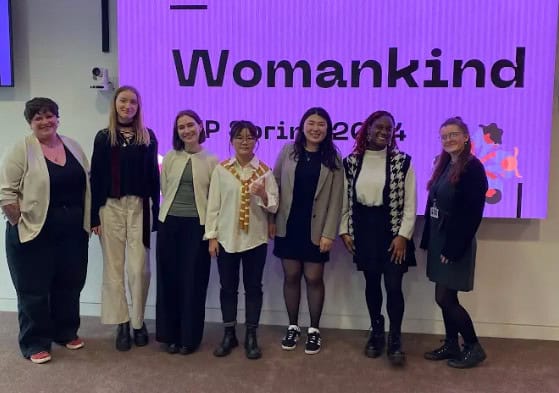
And the winners were…
…everyone! In the panel’s eyes, every single student who took part in SIP had obviously contributed a great deal: all the presentations were in-depth and professional, with confident speakers and some clever delegating along the way.
However, we did choose to highlight the following winners:
- Best presenter: we couldn’t narrow this down to just one person, so instead selected one presenter from each team. This was based on their confidence but also their ability to convey information clearly to the audience.
- Best slides: we loved the sleek design of the OTR team! We couldn’t get over how professional they looked – we’d certainly have been proud to produce them.
- Best overall presentation: our final award went to Womankind’s team. As I mentioned above, they showed maturity far beyond their experience to build such a strong client relationship and create a final report that answered their brief perfectly.
All in all, it was a wonderful afternoon and paid testament to how hard the students had worked on their projects, and the positive relationships they’d fostered with their partners and mentors. Congratulations to all!
